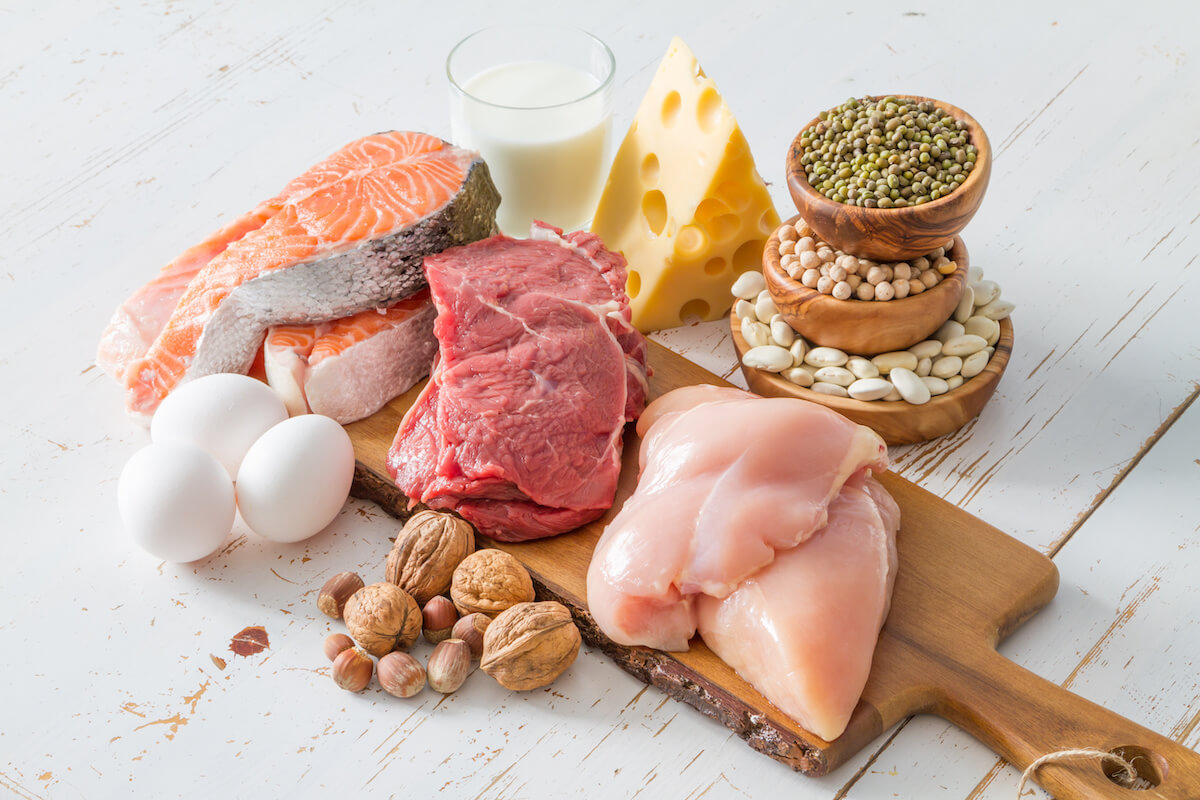
26 May Does Protein Give You Energy? Yes, But Not the Way You Think
In health circles, protein has quite a reputation. Its health benefits include helping with muscle growth, weight loss, and even managing cholesterol and blood sugar. The question is, does protein give you energy too?
Let’s examine how the body uses protein and whether it can improve your energy levels. We’ll also discuss some of the best sources of protein to make sure you’re getting optimal nutrition to meet your body’s needs.
Does Protein Give You Energy?
Protein is one of the three macronutrients, which also include carbohydrates and fats. Each of these is essential to the healthy functioning of your body, and each is used in different ways.
When your body is looking for energy, it starts with the source it can most easily access — carbs. When you consume carbohydrates, such as starch or sugar, your body quickly and easily breaks those down into glucose. That glucose is freely available in your body as a source of energy, so it gets used first. Carbohydrates provide 4 calories of energy per gram.
If you’re working out intensely, eventually you will use up the freely available glucose from carbs. Your body will then turn to your stored fat, which provides 9 calories per gram. Before it can be used, though, your fat stores need to be broken down into fatty acids, which means your body is working harder to access that energy.
So does protein give you energy too?
How Protein Works
Much like carbohydrates, protein supplies you with 4 calories per gram. However, it works quite differently.
When you consume protein, your digestive system breaks it down into amino acids. These amino acids are like building blocks that are then recombined — through a process known as protein synthesis — into new proteins that your body can use.
It uses those new proteins first and foremost to build, maintain, and repair various elements of your body, for example:
- To build muscle mass, bones, and organs — in fact, the entire structure of your body— as well as to maintain and repair those tissues
- To produce and regulate the hormones, enzymes, and hemoglobin that keep all parts of your body functioning well
- To produce antibodies that support your immune system
Only when you’ve depleted the more freely available carbs and fats — for example, if you’re restricting calories and/or involved in some form of endurance exercise — does protein give you energy.
Amino acids have a similar chemical structure to glucose, but they also contain nitrogen. So before amino acids from protein can be used, your body needs to remove the nitrogen. That extra step makes using protein for energy a far less efficient process.
Also, if there aren’t enough amino acids circulating, your body will need to break down some of your muscle protein to access the glycogen stored there. That’s not ideal as you then lose some of your lean muscle mass, which is so important for overall health.
So protein does give you energy, but only as a last resort.
Then why do people swear by it? The answer to that is slightly more complicated: Protein can make you feel like it’s giving you energy.
Sneaky Ways Protein “Gives You Energy”

We’ve established that protein isn’t your body’s first resource for energy, but it does provide other benefits that can translate into feeling energized. For example:
- Protein is relatively slow-digesting, so it increases your satiety, helping you feel fuller for longer. No one feels energetic when they’re hungry. In contrast, when you’ve had enough to eat (but not too much), you feel fueled and ready to go.
- Protein helps move oxygen and other nutrients around your body. Without easy access to enough oxygen and nutrients, you’re guaranteed to feel tired.
- Protein helps manage your blood sugar levels. When you eat sugary foods or refined carbohydrates, you’ll often experience a sugar spike and then a subsequent crash. In contrast, protein gives you a smaller and slower rise in blood sugar, even if you add some healthy carbs like whole grains or sweet potatoes to the mix. That helps you feel energized for longer without the dreaded crash.
- Protein is involved in managing your body’s store of iron, which is critically important for energy levels. Without enough iron, fatigue quickly sets in.
- Protein is involved in building muscle and hormones, both of which affect the body’s metabolism. And your metabolism has a big impact on your energy levels.
- Protein improves your quality of sleep. A good night’s sleep gives your body the time and space it needs to carry out all sorts of repair work. When you wake up, you feel restored, refreshed, and energized.
All these elements add up to more energy and a general feeling of well-being.
How Much Protein Do You Need?
Protein does give you energy, although only as a last resort. Instead, it’s best used for other functions. That said, it’s critical to get enough protein so your body can use it for all those other functions.
The amount of protein you need depends primarily on your age and level of activity:
- The average moderately active person needs 0.8 grams of protein per kilogram of body weight per day.
- If you’re an athlete or bodybuilder, you may need around 2 grams per kilogram.
- Mature adults also need more protein — up to 1.5 grams per kilogram — to counteract the loss of muscle mass that naturally occurs as you age.
When increasing your protein intake, the key is to choose good sources of protein.
Best Types of Protein

If you’re following (or thinking of following) a high-protein diet, it’s worth knowing an important fact about protein.
Some proteins are classified as complete, while others are incomplete. Complete proteins provide you with all the essential amino acids your body needs but can’t make. Incomplete protein foods don’t.
Complete proteins are often animal-based, for example, beef, chicken, fish, eggs, and dairy products — which also provide helpful calcium. However, there are some plant-based complete proteins, including quinoa, hemp, chia seeds, and soy products.
Many vegan sources of protein are incomplete. These include legumes, whole grains like brown rice, nuts, seeds, and cereals like whole-wheat bread. Some of these incomplete proteins can be combined over the course of a day, providing you with the full range of amino acids. Rice and beans are a well-known combination, as are nut butter and whole-grain toast.
If you’re struggling to get enough protein from food, you might want to consider adding a protein supplement to your daily routine.
Protein Powders for Protein Shakes
Protein powder supplements can come from many different sources. Some of the most popular are whey protein isolate or concentrate, while pea protein and hemp protein are well-known vegan options.
Protein powders are commonly used in protein shakes or smoothies, which are convenient and portable, and can be made in a host of different flavors. Try adding banana, nut butter, spinach, berries, chia seeds, and/or raw cacao, along with yogurt or nut milk. Protein powders can also be added to cereals, soups, stews, and other delicious foods.
If you’re investing in a protein powder, remember that quality matters and you get what you pay for. A really good choice would be any product that contains Ingredient Optimized protein. Ingredient Optimized protein has been independently proven to be more bioavailable than non-optimized products, supporting increased muscle mass, strength, and recovery.
Look out for these partner products:
- Myprotein The ioPEA
- Kaged Muscle Plantein
- Kaged Muscle Clean Meal
- Performix ioWhey Protein
- Glaxon Wonder Collagen Protein
Important notes:
- Protein supplements should always be used as part of a balanced diet that includes healthy carbs, healthy fats, and plenty of fresh fruit and vegetables. If you’re not sure how to plan your meals to make sure you get all the nutrients you need, consult a nutritionist or dietitian for advice.
- If you have a medical condition of any kind, check with your doctor before taking protein supplements.
Protein Does Give You Energy – Eventually
You need protein so your body can function well. You also need healthy carbs and fats — and these are the first resources your body uses for energy.
Does protein give you energy? Yes, eventually.
Protein is used primarily for building your structure and keeping your system working correctly. However, when the available carbs and fats are depleted, your body will resort to using protein by breaking down your lean muscle to access the glycogen stored there. Protein also supports your body in other, more subtle ways.
As such, make sure you get enough protein, whether that’s from animal-based or plant-based sources. If you can’t get enough from food, a high-quality protein supplement can make sure your body’s getting what it needs to function optimally every day.


